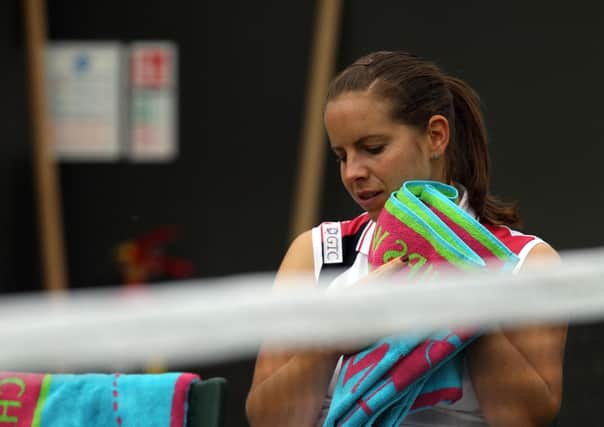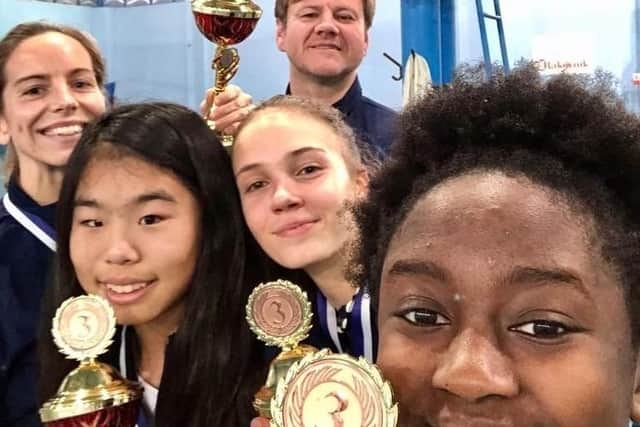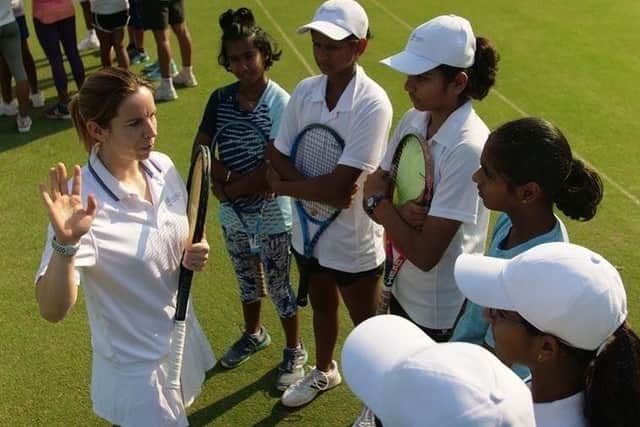Katie O’Brien back in love with tennis as she takes new route to the top


Back in 2011 she needed out. Her motivation was on the wane. Having reached the top 100 in the world, she was guilty of not having the drive to push further.
On top of that, her enthusiasm for the bubble she had immersed herself in since her early years growing up in East Yorkshire was starting to dim.
Advertisement
Hide AdAdvertisement
Hide AdShe yearned for a new life, something like the normal most other people in their mid-20s enjoy.


Ever the opportunist, she found it. O’Brien did a law degree at the Open University, and then got a job in the city, first in recruitment and then in insurance.
“I needed that opportunity of not being defined as a tennis player,” she tells The Yorkshire Post.
“I wanted to be anonymous, to have that routine of putting a business suit on instead of the tennis kit, commuting into the city with millions of others.
“Being able to go for a drink after work.”


Advertisement
Hide AdAdvertisement
Hide AdThrough it all, tennis became enjoyable again, first as a few ad-hoc coaching sessions, and then as a way to stay fit with friends.
Allied with that rekindled passion was a realisation that the grass is not always greener on the other side.
“I enjoyed working initially, but the novelty soon wore off. It wasn’t necessarily the routine, it was being sat behind a desk,” she says.
Fortunately for the former British No 1 from Hessle, a route back into the sport that defined her for so long, was right around the corner. She just needed the courage to take it.
Advertisement
Hide AdAdvertisement
Hide Ad“I was really lucky in 2017 that a role came up for national junior coach with the LTA (Lawn Tennis Association),” reflects O’Brien.
“I was scared to ask about it, because I’d been out of the sport for five years, I feared I had lost touch with the modern game.
“Fortunately, I was invited to come and interview. I wouldn’t have applied for it off my own back due to being away from the game for so long.
“But the LTA facilitated me coming back in and I learned on the job for the first year or so.”
Advertisement
Hide AdAdvertisement
Hide AdAfter three years of coaching at Under-14s and Under-12s level, of mentoring girls and boys, O’Brien has now been promoted to the position of women’s national coach for the LTA.
One rung under the head of female tennis, she is tasked with developing the best juniors and aspiring professionals in Britain.
“I wasn’t sure if I was ready, but it’s not too dissimilar to my current role,” says O’Brien, who was in the middle of transitioning between the two positions when the coronavirus lockdown struck and she and a large percentage of LTA staff were furloughed.
It has been a rapid rise for O’Brien, one that she accepts has come with a lot of learning on the job.
Advertisement
Hide AdAdvertisement
Hide Ad“It took me a while to work out what my philosophy is and I still don’t think I know exactly what it is,” she adds.
“I think it’s something that forms over time, through experience.
“I feel more of a mentor, I don’t get involved as much with the technical input unless it’s something like the physical and mental factors, how to handle the pressure, that’s where I can use my experience and relate.
“The best players are the ones who are tougher under pressure and play the big points a little bit smarter.
Advertisement
Hide AdAdvertisement
Hide Ad“So I’m not in your face, I don’t feel like I have to motivate a player. When I was a player I used to like my own space, to have my own independence to figure things out for myself.
“Not every player is like that, they want someone who is on their case all the time, but I think the art of a good coach is someone who can lead a player to solve their own problems rather than telling them what to do all the time.
“There’s a danger of becoming a bit robotic and not being able to solve problems when you’re under pressure.”
How O’Brien could have done with such counsel as she reached her own personal crossroads nearly a decade ago.
Advertisement
Hide AdAdvertisement
Hide AdLife for a young British woman on the tennis tour was not an easy one. O’Brien had to fight for everything she got, and while regret is perhaps too strong a word to use to define her feelings about walking away from the game, there is a sense that she left too early.
“I was pretty young when I retired, I was only 25, but at the time it felt like a lifetime because of how much I had invested in my career, all the sacrifices I had made,” says O’Brien, who twice reached the second round of grand slams and won four times on the ITF Tour.
“I thought I’d maximised my potential, but you’re learning all the time.
“My goal was to get inside the top 100 and I did that, and that’s something I’m still really, really proud of.
Advertisement
Hide AdAdvertisement
Hide Ad“But I lost the motivation once I achieved that, I wasn’t sure where to go next. I didn’t believe I could get any higher, and that was my undoing in the end. I thought I had reached my limit and there was nowhere else to go.
“I wish I had a bit more belief in myself. I wish I had backed myself a little bit more. Even when I got inside 100, I didn’t truly believe I belonged there. I felt I was a bit lucky in a way, which is ridiculous given how hard it was to get there.
“I’m 5ft 5in tall, so physically it was always tough going for me because I one of the smaller players on the tour, and I didn’t really have an expansive game.
“I had a strong forehand but I didn’t really have a ‘plan B’. I had one way of playing and a whole load of character, and that’s what got me inside the top 100, the fact that I hate losing.
Advertisement
Hide AdAdvertisement
Hide Ad“I’m pretty stubborn, I put in the hard work day in, day out, and it’s difficult to know where to go after that.
“Looking back now, if I had been playing with the perspective I’ve got now I would have been a lot better at dealing with pressure on the court.
“I loved competing but my emotional control was not the best. I used to absolutely flip out at the slightest bit of adversity and I’d keep fighting, but I was fighting myself rather than my opponent.”
There is catharsis to O’Brien’s return to tennis, if not one fuelled by a desire to complete unfinished business.
Advertisement
Hide AdAdvertisement
Hide AdIf she never truly believed she could find the next gear, she has the chance now to imbue others with the belief that they can.
“I’ll often share my experiences. Where I can help players is sometimes talking about the lessons I’ve learned from the things I could have done better, and some of the things I did well,” she says.
“I think I’m quite relatable. I think people look at me and think if she can do it then why can’t I?
“Hopefully, I can give a bit of belief to the upcoming generation.
Advertisement
Hide AdAdvertisement
Hide Ad“I got to 84th in the world. I hope the players I’m working with will aspire to get to a higher level than that, but it’s a good starting place.
“I never played tennis to be rich and famous. I played it because I loved it and I loved competing.
“Since I’ve stopped playing I’ve realised I actually get a lot out of helping other people.
“It’s a sport that doesn’t feel like a job again, it feels like a hobby.”
Advertisement
Hide AdAdvertisement
Hide AdEditor’s note: first and foremost - and rarely have I written down these words with more sincerity - I hope this finds you well.
Almost certainly you are here because you value the quality and the integrity of the journalism produced by The Yorkshire Post’s journalists - almost all of which live alongside you in Yorkshire, spending the wages they earn with Yorkshire businesses - who last year took this title to the industry watchdog’s Most Trusted Newspaper in Britain accolade.
And that is why I must make an urgent request of you: as advertising revenue declines, your support becomes evermore crucial to the maintenance of the journalistic standards expected of The Yorkshire Post. If you can, safely, please buy a paper or take up a subscription. We want to continue to make you proud of Yorkshire’s National Newspaper but we are going to need your help.
Postal subscription copies can be ordered by calling 0330 4030066 or by emailing [email protected]. Vouchers, to be exchanged at retail sales outlets - our newsagents need you, too - can be subscribed to by contacting subscriptions on 0330 1235950 or by visiting www.localsubsplus.co.uk where you should select The Yorkshire Post from the list of titles available.
Advertisement
Hide AdAdvertisement
Hide AdIf you want to help right now, download our tablet app from the App / Play Stores. Every contribution you make helps to provide this county with the best regional journalism in the country.
Sincerely. Thank you.
James Mitchinson
Editor